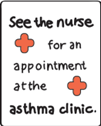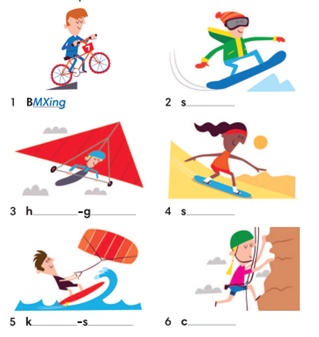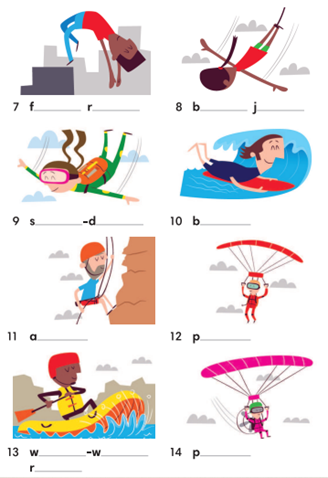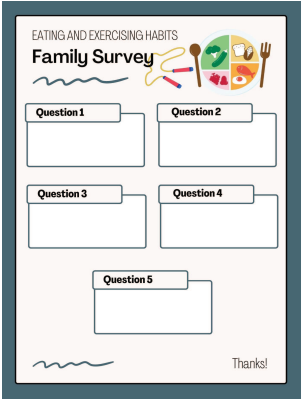Giải SGK, SBT Unit 7. Take a deep breath English Discovery
Giải SGK, SBT Unit 7. Take a deep breath English Discovery
1 Study the Vocabulary box. In pairs, use the words and phrases to describe the people in the picture.
(Nghiên cứu hộp Từ vựng. Theo cặp, sử dụng các từ và cụm từ để miêu tả những người trong tranh.)
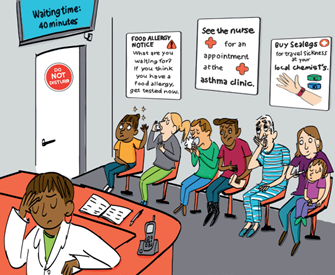
I think the girl has got asthma. Perhaps the boy has got a virus.
(Tôi nghĩ cô gái này bị hen suyễn. Có lẽ cậu bé đã bị nhiễm virus.)
The woman has got a headache. The boy is sneezing.
(Người phụ nữ bị đau đầu. Cậu bé đang hắt hơi.)
|
Vocabulary Health problems (Từ vựng) (Các vấn đề sức khoẻ) |
|
allergy asthma bug food poisoning hay fever infection injury travel sickness insomnia migraine virus |
Từ vựng:
allergy (n): dị ứng
asthma (n): bệnh hen suyễn
bug (n): sâu bọ
food (n): đồ ăn
poisoning (n): ngộ độc
hay fever (n): sốt mùa hè
infection (n): sự nhiễm trùng
injury (n): chấn thương
travel sickness (n): say xe
insomnia (n): mất ngủ
migraine (n): chứng đau nửa đầu
virus (n): vi-rút
3 7.01 WORD FRIENDS Complete the Word Friends box with the words below. Listen and check.
(Hoàn thành ô Word Friends với các từ bên dưới. Nghe và kiểm tra.)
|
a check-up a rash a temperature some tablets your blood pressure |
Từ vựng:
a check-up: kiểm tra
a rash: phát ban
a temperature: nhiệt độ
some tablets: một số viên thuốc
your blood pressure: huyết áp của bạn
your voice: giọng nói của bạn
Feeling ill
(Cảm thấy ốm)
come down with the flu / something
(bị cúm/cái gì đó)
have a rash / a runny nose / / a nose bleed / a cough / an infection
(bị phát ban / sổ mũi /..../ chảy máu mũi / ho / nhiễm trùng)
lose your appetite / .
(mất cảm giác ngon miệng/......)
Seeing the doctor
(Gặp bác sĩ)
get a prescription
(nhận được một đơn thuốc)
have .
(có....)
listen to your chest
(hãy lắng nghe lồng ngực của bạn)
take your temperature / .
(đo nhiệt độ của bạn /.....)
Getting better
(Trở nên tốt hơn)
get lots of rest
(nhận được rất nhiều phần còn lại)
stay in bed
(ở trên giường)
take medicine / .
(uống thuốc /....)
1 If a person is colour blind, why is it difficult to do the things below?
(Nếu một người bị mù màu thì tại sao việc thực hiện những điều dưới đây lại khó khăn?)
|
cook choose clothes drive a car read a geography book |
Từ vựng:
cook (v): nấu ăn
choose clothes: chọn quần áo
drive a car: lái xe
read a geography book: đọc một cuốn sách địa lý
4 Study the Grammar box. Find more examples of reported speech in the text.
(Nghiên cứu hộp ngữ pháp. Tìm thêm ví dụ về lời nói tường thuật trong văn bản.)
|
Grammar Reported statements and questions (Ngữ pháp) (Câu tường thuật và câu hỏi) |
|
Present Simple->Past Simple (Hiện tại đơn-> Quá khứ đơn) ('Tôi bị đau đầu.' Anh ấy nói (rằng) anh ấy bị đau đầu.) Present Continuous-> Past Continuous Hiện tại tiếp diễn->Quá khứ tiếp diễn ‘I’m getting better.’ She said (that) she was getting better. ('Tôi đang khỏe hơn.' Cô ấy nói (rằng) cô ấy đang khỏe hơn.) Past Simple->Past Perfect (Quá khứ đơn-> Quá khứ hoàn thành) ‘I wanted to be a doctor.’ He said (that) he had wanted to be adoctor. (‘Tôi muốn trở thành bác sĩ.’ Anh ấy nói (rằng) anh ấy muốn trở thành bác sĩ.) (sẽ) (‘Mẹ tôi sẽ làm điều đó’. Anh ấy nói (rằng) mẹ anh ấy sẽ làm điều đó.) (có thể) (‘Tôi không thể nhìn thấy gì cả’. Cô ấy nói (rằng) cô ấy không thể nhìn thấy gì cả.) (Câu hỏi) (‘Bạn có làm việc ở bệnh viện không?’ Cô ấy hỏi tôi có làm việc ở bệnh viện không.) (“Mấy giờ rồi?” Anh ấy hỏi bây giờ là mấy giờ.) (Những thay đổi khác) (Chúng ta thường thay đổi đại từ, cụm từ chỉ thời gian và trạng từ chỉ địa điểm.) now->then (bây giờ->sau đó) here->there (ở đây->ở đó) this month->that month (tháng này->tháng kia) (hôm qua->ngày hôm trước / ngày hôm trước) (ngày mai->ngày hôm sau) |
3 Study the Grammar box. Find more examples of reported commands and requests in the dialogue.
(Nghiên cứu hộp ngữ pháp. Tìm thêm ví dụ về các tường thuật ra lệnh và yêu cầu được báo cáo trong đoạn hội thoại.)
|
Grammar Reported commands and requests (Ngữ pháp) (Câu tường thuật ra lệnh và yêu cầu được báo cáo) |
|
Commands (Câu lệnh) ‘Move the left leg first.’ I told you to move the left leg first. (‘Di chuyển chân trái trước.’ Tôi bảo bạn di chuyển chân trái trước.) (‘Đừng vội.’ Cô ấy bảo chúng tôi đừng vội.) ‘Can you help me, please?’ He asked them to help him. (‘Bạn có thể giúp tôi được không?’ Anh ấy nhờ họ giúp anh ấy.) (‘Xin đừng chạm vào thiết bị y tế.’) |
2 7.08 Study the Vocabulary box. Write the words in the correct category. Use a dictionary if necessary. Listen and check.
(Nghiên cứu hộp Từ vựng. Viết các từ vào đúng thể loại. Sử dụng từ điển nếu cần thiết. Nghe và kiểm tra.)
|
Vocabulary Extreme sports (Từ vựng) (Những môn thể thao mạo hiểm) |
|
abseiling BMXing bodyboarding bungee jumping free running hang-gliding (ice) climbing kite-surfing |
Từ vựng:
abseiling: leo dốc
BMXing: đua xe địa hình
bodyboarding: lướt ván nằm
bungee jumping: nhảy bungee
free running: chạy tự do
hang-gliding: bay lượn
(ice) climbing: leo núi (tuyết)
kite-surfing: lướt ván diều
parachuting: nhảy dù
paragliding: dù lượn
sandboarding: trượt cát
sky-diving: nhảy dù
snowboarding: trượt tuyết
white-water rafting: chèo thuyền vượt thác ghềnh
● on land: .
(trên mặt đất)
● in the air: .
(trên không)
● on / in the water: .
(trên/ trong nước)
4 Study the Speaking box. Find more examples in the dialogue.
(Nghiên cứu hộp Nói. Tìm thêm ví dụ trong đoạn hội thoại.)
|
Speaking Asking for and giving advice |
|
Asking for advice What do you suggest? (Bạn có đề nghị gì?) (Nếu bạn là tôi, bạn sẽ làm gì?) (Lời khuyên của bạn là gì?) (Bất cứ ý tưởng phải làm gì?) If I were you, I’d drink warm water with some honey and lemon. (Nếu tôi là bạn, tôi sẽ uống nước ấm với một ít mật ong và chanh.) (Tốt nhất bạn nên đến gặp bác sĩ.) (Bạn nên về nhà.) (Tôi đề nghị nghỉ ngơi một chút.) (Nó có thể là một ý tưởng tốt để…) (Bạn đã nghĩ đến việc hẹn gặp bác sĩ chưa?) (Bạn đã thử bôi một ít kem lên nó chưa?) (Hãy thử giữ mũi của bạn.) (Tôi muốn giới thiệu/khuyên/đề nghị dùng aspirin.) I don’t know what to advise / suggest, I’m afraid. (Tôi không biết nên khuyên/gợi ý điều gì, tôi sợ.) (Tôi ước gì tôi có thể giúp đỡ/đề nghị điều gì đó, nhưng tôi…) |
|
Writing A survey (Viết) (Một cuộc khảo sát) |
|
Writing effective survey questions: (Viết câu hỏi khảo sát hiệu quả:) (Viết những câu hỏi đơn giản.) (Đặt những câu hỏi cụ thể: Thay vì hỏi "Bạn có tập thể dục thường xuyên không?", hãy hỏi "Bạn tham gia các hoạt động thể chất bao nhiêu lần một tuần?") (Tránh hỏi hai câu hỏi cùng một lúc.) (Viết các phương án giống nhau về hình thức.) (Viết câu hỏi phù hợp và phù hợp với đối tượng mục tiêu.) (Tránh các câu hỏi có/không.) |
4 Read the Writing box and decide which questions in Exercise 1 and 3 should not be used.
(Đọc phần Viết và quyết định những câu hỏi nào trong Bài tập 1 và 3 không nên sử dụng.)
3 Complete the text with the words below.
(Hoàn thành văn bản với các từ dưới đây.)
|
dizzy prescribe dizziness ill painful tiredness travel sickness |
Từ vựng:
dizzy: chóng mặt
prescribe: kê đơn
dizziness: bệnh chóng mặt
ill: bị bệnh
painful: đau đớn
tiredness: sự mệt mỏi
travel sickness : say xe
Motion sickness
It’s that horrible feeling that starts in your stomach. You feel dizzy, you feel sick and for some people it ends with a headache. Although,it’s often called it’s really motion sickness. Some people get it on exciting rides at the fair or even watching 3D movies where they complain
of and nausea. In very serious cases, the doctor might tablets, but there are other remedies such as ginger or wristbands that don’t cause . Other remedies include sitting on brown paper! Maybe it’s worth trying as nobody wants to be on holiday.
(Say tàu xe
Đó là cảm giác khủng khiếp bắt đầu trong dạ dày của bạn. Bạn cảm thấy chóng mặt, bạn cảm thấy buồn nôn và đối với một số người, nó kết thúc bằng một cơn đau đầu. Mặc dù, nó thường được gọi là…nó thực sự là chứng say tàu xe. Một số người có được nó khi tham gia các chuyến đi thú vị tại hội chợ hoặc thậm chí xem phim 3D mà họ phàn nàn về.... và buồn nôn. Trong những trường hợp rất nghiêm trọng, bác sĩ có thể....viên thuốc, nhưng có những biện pháp khắc phục khác như gừng hoặc vòng tay không gây ra.... Các biện pháp khắc phục khác bao gồm ngồi trên giấy màu nâu! Có lẽ nó đáng để thử vì không ai muốn...đi nghỉ.)
5 7.15 Mark the stress in the words below. Write them in the correct category in Exercise 4. Listen and check.
(Đánh dấu sự căng thẳng trong các từ dưới đây. Viết chúng vào đúng mục trong Bài tập 4. Nghe và kiểm tra.)
|
allergy, allergic
|
Từ vựng:
allergy (n): dị ứng
allergic (a): bị dị ứng
asthma (n): bệnh hen suyễn
asthmatic (a): bị hen suyễn
depress (a): chán nản
depression (n): trầm cảm
dyslexia (a): chứng khó đọc
dyslexic (n): chứng khó đọc
infect (v): lây nhiễm
infection (n): sự lây trùng
infected (a): bị lây nhiễm
prescribe (v): kê toa
prescription (n): đơn thuốc
1. Match the words below with the descriptions.
(Ghép các từ bên dưới với mô tả.)
|
asthma |
food poisoning |
hay fever |
infection |
|
injury |
insomnia |
migraine |
travel sickness |
1. My head hurts, I have a pain behind my eyes and I feel sick. _______
2. I cut my hand yesterday. Now it's red and feels hot. _______
3. In the summer when I go outside, I have a runny nose and itchy eyes. _______
4. Sometimes it's very difficult for me to breathe. _______
5. I can't sleep at night. _______
6. I feel sick on long car journeys. _______
7. I ate some seafood earlier and now I'm feeling really sick. _______
8. I've broken my arm. _______
3. WORD FRIENDS: Match verbs 1-6 with nouns a-f.
(Nối động từ 1-6 với danh từ a-f.)
|
1. ☐ get |
a. your voice |
|
2. ☐ lose |
b. lots of rest |
|
3. ☐ take |
c. in bed |
|
4. ☐ have |
d. your chest |
|
5. ☐ listen to |
e. a nose bleed |
|
6. ☐ stay |
f. your temperature |
5. Complete the dialogue with the words below.
(Hoàn thành đoạn hội thoại bằng các từ dưới đây.)
|
deep |
hurt |
matter |
serious |
|
something |
take |
worry |
Doctor: Good morning. What seems to be the (1) _______?
Alice: I'm in pain, doctor.
Doctor: I see. Where does it (2) _______?
Alice: Just here - above my stomach.
Doctor: OK... let me see. Now, take a (3) _______ breath.
Alice: Is it (4) _______?
Doctor: Oh no. It's nothing to (5) _______ about. It's just a stomach bug.
Alice: That's good. Is there anything I can (6) _______ for it?
Doctor: Yes, here's (7) _______ for the pain.
6. Complete the table.
(Hoàn thành bảng.)
|
Noun |
Verb |
Adjective |
|
asthma |
- |
|
|
infect |
||
|
- |
ill |
|
|
pain |
- |
|
|
prescribe |
- |
7. Complete the sentences with the correct adjective or noun form of the words below.
(Hoàn thành các câu bằng dạng tính từ hoặc danh từ thích hợp của các từ bên dưới.)
|
asthma |
ill |
infect (x2) |
pain |
prescribe |
1. The place where I cut myself is red and painful - I think the cut is _______.
2. The doctor gave me a _______ for antibiotics.
3. Keep that cut covered up or you might get an _______.
4. I can't move my leg - it's too _______.
5. I have to use an inhaler because I'm _______.
6. Tara missed a lot of school this year because of her _______.
1. Match the words below with the definitions.
(Ghép các từ bên dưới với định nghĩa.)
|
bandage |
burn |
concussion |
|
myth |
symptom |
throat |
1. something which isn't true myth: _______
2. the area at the back of your mouth: _______
3. a head injury that makes you feel ill or become unconscious: _______
4. a long thin piece of material that you put around a cut: _______
5. an injury you get from touching something very hot: _______
6. one of the effects of an illness: _______
1. Complete the sentences with the words below.
(Hoàn thành các câu bằng những từ dưới đây.)
|
asked |
me |
not |
to |
told |
us |
1. 'Put it down.'
She _______ me to put it down.
2. 'Lie down, please.'
The doctor _______ me to lie down.
3. 'Everybody, listen carefully, please.'
The teacher asked _______ to listen carefully.
4. 'Don't work too hard.'
He told us _______ to work too hard.
5. 'Lift your arm, please.'
The nurse asked _______ to lift my arm.
6. 'Fill in the form.'
The man told me _______ fill in the form.
5. Complete the text with reported commands and statements. Use the correct form of the prompts below.
(Hoàn thành văn bản với các lệnh và câu lệnh được báo cáo. Sử dụng dạng đúng của các lời nhắc bên dưới.)
|
ask/me/call |
ask/me/describe |
ask/me/ phone |
ask/me/tell |
|
ask/they/let |
tell / he / sit down |
tell / me / make sure |
tell/me/not panic |
Last week, I was with my friend Joel when he said he was in pain and he (1) _______ an ambulance. I called 999 and the woman on the phone (2) _______ the problem. She also (3) _______ her if Joel was taking any medicine. Then she (4) _______ he was comfortable, so I (5) _______ and not move. The woman on the phone said the ambulance would be there in a few minutes and (6) _______, which was difficult! When the ambulance arrived, they took Joel to hospital and I (7) _______ me come too. When we got there, they told me he had appendicitis and
(8) _______ his parents. In the end, he had an operation and was fine.
1. Complete the sentences with the words below.
(Hoàn thành các câu bằng những từ dưới đây.)
|
abseiling |
allergy |
bug |
|
hay fever |
injury |
travel sickness |
1. Every summer it's the same: my _______ me sneeze all day! makes
2. Scott got a bad _______ when he was playing football last week.
3. Take this medicine. It will stop you getting _______ when you're on the boat.
4. I can't eat that. I have a food _______.
5. The doctor said I have that _______ that's going round at the moment.
6. I tried _______ once, but I was too scared to climb down the wall.
5. Complete the dialogues with the words below. There are two extra words.
(Hoàn thành các đoạn hội thoại với các từ bên dưới. Có hai từ thừa.)
|
advice |
any |
could |
going |
good |
|
if |
know |
something |
would |
you |
1.
A: What's the matter, Ben?
B: I've burnt my hand. _______ ideas what to do?
A: If I were _______, I'd put it under a cold tap.
B: Good idea. Thanks.
2.
A: I've got this pain in my leg. What's your _______?
B: I wish I could suggest _______, but I can't. It might be a _______ idea to see a doctor.
3.
A: So, if you were me, what _______ you do?
B: I'd recommend _______ to see the school nurse. I don't really _______ what to advise myself, I'm afraid.
CÁC BÀI TẬP KHÁC



